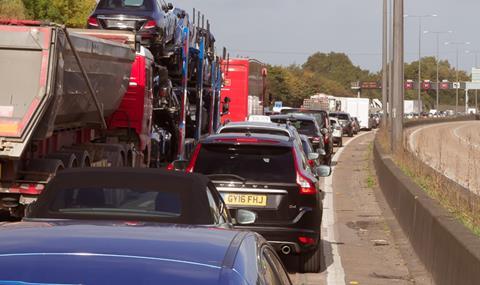
Traffic congestion cost UK drivers more than £37.7bn in 2017, with the UK ranking as the tenth most congested country in the world and the third most congested in Europe, behind only Russia and Turkey, according to new research.
The Inrix 2017 Global Traffic Scorecard, which analysed data from connected cars and devices across 38 countries, including 11 cities and towns across the UK, found that the costs of congestion for all UK drivers came to more than £37.7bn in 2017, or an average of £1,168 per driver.
It also found that for the tenth year running London was the UK’s most congested city, with motorists spending approximately 74 hours a year caught up in peak time congestion, costing each of them £2,430 per annum, or £9.5bn across the city as a whole, up from £3.3bn in 2016.
Manchester was the second worst city for time spent in peak time congestion, with drivers spending 39 hours in gridlock and an average of 10% of their total drive time stuck in traffic.
However, Scottish cities were found to have made significant improvements from 2016 with Aberdeen, Glasgow and Edinburgh reducing peak hours in congestion by 20%, 15% and 10% respectively.
Read more
- The UK has some of the world’s most congested cities, find two reports
- Proposed Port of Dover HGV congestion charge refused by council
- RHA dismisses claim that road building doesn’t cut congestion
The report also ranked the UK’s most congested roads, with the A406 Northbound from Chiswick roundabout to Hangar Lane, where drivers spent 56 hours each on average in peak time congestion last year, the worst offender.
Outside of the capital, the A34 from Robin Hood Lane in Birmingham was the most congested road – and the fourth worst congested in the UK – with drivers each spending on average 44 hours in gridlock last year.
Dr Graham Cookson, Inrix chief economist, said: “Increased flexible working or road charges have potential, however, transport authorities should be looking to exciting developments in data analytics and AI which promise to reinvent our approach to traffic management.”
Chris Dyer, infrastructure asset management expert at infrastructure software and services provider Yotta, echoed this view.
“If highway maintenance organisations are to minimise their contribution to the issue of traffic-congestion and support economic growth they must adopt modern approaches to asset management, embracing new technologies to exploit the breadth of data available to inform and enhance their planning decisions,” he said.
Kent University Professor Roger Vickerman, former member of the Trunk Road Assessment Standing Committee, called for nationwide road pricing to tackle congestion.
‘‘We already have blunt instruments such as the London Congestion Charge, but a sophisticated system of electronic tolling would charge drivers for their actual use of the system and by differentiating by time of day can encourage those with flexibility to adjust their journeys to times of lower traffic volumes,” she said.
Image: Shutterstock













